Books
Books
in random order
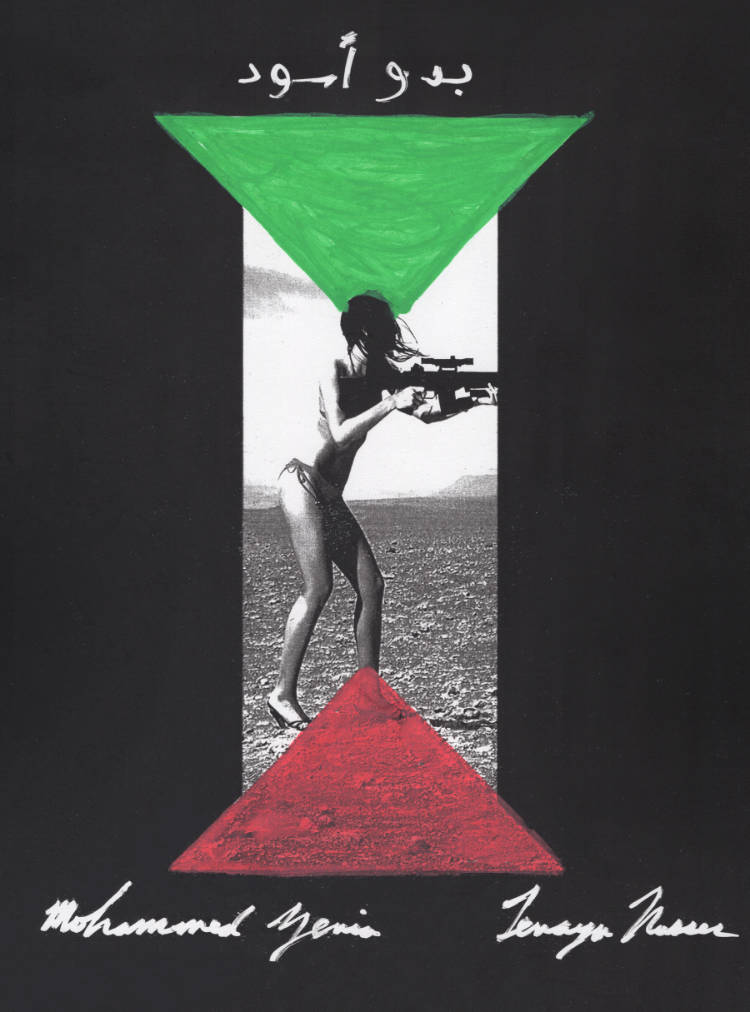
Black Bedouin
Black Bedouin, by Mohammed Zenia and Tenaya Nasser is a book of the IMMEDIATE — written immediately (in the span of five days, very literally at the printing press at 1080PRESS) in response to the current genocide against, and in solidarity with, the people of Sudan and in the context of immediate echoes in Palestine, Congo, Pakistan, and more — and throughout it all imbued with the immediacy that the global situation demands of us and our moral consciences. Black Bedouin rings in the creative immediacy of New York School all-night-writing-to-mimeograph-next-day with the political immediacy of a this-is-happening-right-now Crass single or Etel Adnan's incomparable (but here spiritually correlated) The Arab Apocalypse. In other words, Black Bedouin hits every star in a very cool and specific constellation. — Dave Morse

BFTK — Issue 4: On Translation, Transmission & Transposition
Andrew Walsh‐Lister, Matthew Stuart and 2 more
Bricks from the Kiln is an irregular journal edited by Andrew Lister and Matthew Stuart, sometimes with guest editors, that presents graphic design and typography as disciplines activated by and through other disciplines and lenses such as language, archives, collage, and more. It borrows its title from the glossary notes of Ret Marut’s "Der Ziegelbrenner," which was the ‘size, shape and colour of a brick’, and ran for 13 issues between 1917 and 1921.
The latest installment, "#4: On Translation, Transmission & Transposition," was published as an event (and now) a publication, with events at London College of Communication, Burley Fisher Books & Pig Rock bothy, Socttish National Gallery of Modern Art, and Inga (in November, 2019).
GREENING
Helen Marten
(front / back flaps)
JOY & HAPPINESS, FIDELITY
& INTIMACY IN TRANSLATION
Sophie Collins
(pp.4–13)
PLANETARY TRANSLATION
Don Mee Choi
(pp.15–19)
TRANSLATION AND A LIPOGRAM:
OR, ON FORMS OF AGAIN-WRITING
AND NO- (OR NOT THAT-) WRITING
Kate Briggs
(pp.23–33)
UNHOMING (1 of 4):
FOLLOWING HÖLDERLIN’S ‘HEIMAT’
Phil Baber
(pp.35–47)
SNOW WHITE AND THE WHITE
OF THE HUMAN EYEBALLS
Joyce Dixon
(pp.51–62)
ALTAMIRALTAMIRALTAMIRA
Florian Roithmayr
(pp.65–116)
LEVEL UP, LEVEL DOWN
Jen Calleja
(pp.119–124)
TRANS.MISSION [A.DIALOGUE]:
A JAVASCRIPT FOR THREE VOICES
J.R. Carpenter
(pp.127–134)
THE MECHANISATION OF ART
Edgar Wind
(glosses / annotations / insertions by
Natalie Ferris & Bryony Quinn)
(pp.137–144)
UNHOMING (2 of 4)
Phil Baber
(p.147)
COMMISSION FOR A NOIR MOVIE
B IN THE BAY OF BISCAY
Rebecca Collins
(pp.151–157)
UNHOMING (3 of 4)
Phil Baber
(pp.150–162)
EVERY CONTACT LEAVES A TRACE;
TRANSCRIBING OSTEON
Naomi Pearce
(pp.165–170)
HOW DOES A WORK END?
Karen Di Franco
(pp.173–193)
METONYMY Op.1 & Op.2
James Bulley
(pp.197–201)
AFRIKAN ALPHABETS EXTENDED
Saki Mafundikwa
(pp.204–207)
SUSAN HILLER: 1983
Natalie Ferris
(pp.209–217)
EVERY TELLING HAS A TALING /
EVERY STORY HAS AN ENDING
Matthew Stuart
(pp.220–233)
GRAPHIC PROPRIOCEPTION
James Langdon
(pp.235–254)
UNHOMING (4 of 4)
Phil Baber
(pp.257–263)
TUNNELLING AND AGGREGATING
FOR DESIGN RESEARCH
Bryony Quinn (text) &
Peter Nencini (images)
(pp.265–272)
LET IT PERCOLATE:
A MANIFESTO FOR READING
Sophie Seita
(pp.275–280)
288 pgs, 22.4 × 17 cm, Softcover, 2020

From static oblivion
A reflection about the status of the image as a balance of forces in tension and a paradoxical act of cancellation of the body through its own representation.
In Ion Grigorescu’s work, as in the book, the body is continually shown in different ways - from photography to film, from performance to drawing - and yet it remains absent, obscuring its own identity in an attempt to question the collective one. As it is impossible to show his art during the regime, it ends up hiding, disappearing inside the image. Instead of showing, the image conceals, because it is non-documentary and non-transmittable; it is an act of birth, a prove of the artist’s resistance, especially as a human being inside (or against) any geographical or historical background. In the rituals of his gestures and in the symbolism of his performances, Grigorescu finds a way to stay alive, preserving his own intellectual status while also defending the dignity of everyday life.
The book traces the progression, both expansive and inclusive, of his work, which inscribes itself into the space of the body and of the world. Grigorescu absorbs elements of the surrounding reality, showing us a continuity between art and life: his act of dissidence is not an outcry of provocation, nor is it extreme; it is an anti-aesthetic operation which uses experimentation and rough techniques to uncover the fiction of art, to denounce the artifice of representation and to affirm images as an instrument of subversive power.
Ion Grigorescu (Bucharest, 1945) is one of the most significant Romanian contemporary artists of the Post-War period and an iconic figure of the conceptual and performative art since the early 70s. He represented Romania at Venice Biennial in 1997 and 2011; his works are in the main public collections, such as MoMA, New York; mumok and Erste Foundation, Vienna; Tate Modern and Deutsche Bank AG, London; Centre Pompidou, Paris.

Ponk!
A punk rock anti-memoir told through the eyes of a biracial Afrolatino punk academic.
¡PÓNK! follows Moose, an alienated academic and lead guitarist for Pipebomb!, as he navigates through spaces in and out of South East Los Angeles: punk clubs, college classrooms, family gatherings, street protests, and euphoric backyard shows.Oscillating between autofiction, memoir, and lyric, Clayton blurs genres while articulating the layered effects of racism, trauma, immigration, policing, Black hair, performance, and toxic academic language to uncover how one truly becomes an "ally." Borrowing from the spatial lyricism of Claudia Rankine, the genre-bending storytelling of Alexander Chee, and the racial musings of James Baldwin, ¡PÓNK!'s narrative takes back punk rock and finds safe space in the mosh pit.
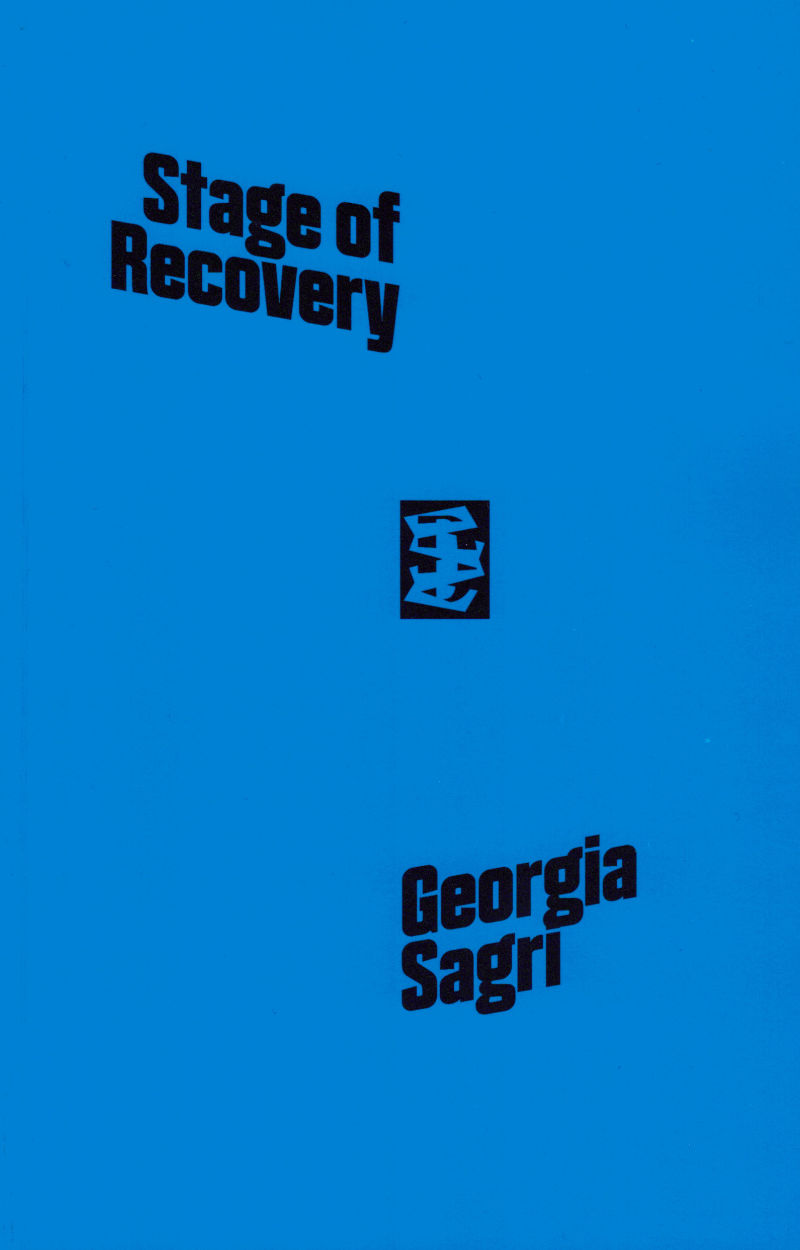
Stage of Recovery
Close to spiritual anarchism, Georgia Sagri’s writing happens in the heat of negotiation. Starting in the months leading up to the occupation of Zuccotti Park in 2011, which became the movement for people’s self-governance known as Occupy, this book carries the energy and commitment of open struggle, direct address, self-organisation and public assembly. It is a critique of representation and its implicit oblivion, told through a decade of artistic and activist practice. The writing is a mode of recovery, it is pre-content shared to encourage open processes in art, thinking and action.
Georgia Sagri (born Athens, 1979) lives and works in Athens and New York. Her practice is influenced by her ongoing engagement in political movements and struggles on issues of autonomy, empowerment and self-organisation. From 1997 to 2001 she was a member of Void Network, a cultural, political and philosophical collective operating in Athens. In 2011 she was one of the main organisers of the Occupy Wall Street movement in New York. Since 2013 she has been a member of the assembly of the Embros Theatre Occupation, and in 2014 she initiated Ύλη[matter]HYLE, a semi-public cultural space in the heart of Athens. She is professor of performance at the Athens School of Fine Arts.

Barking Up the Wrong Tree
How To Become est une maison d'édition autogérée basée à Paris. Nous publions les textes d'auteuces engagés dans des pratiques féministes et peu diffusés par le réseau des grandes maisons d'édition françaises.
Créée en 2016, elle est composée d'artistes et écrivaires en majorité gouines, HTB publie de la litterature expérimentale née d'influences post-post- sapphiques ainsi qu'un choix de tradu d'auteuices non traduites en langue française. HTB s'articule autour d'ateliers d'écriture: How to Become a Lesbian, et d'une revue annuelle publiant les choses issues de l'atelier.
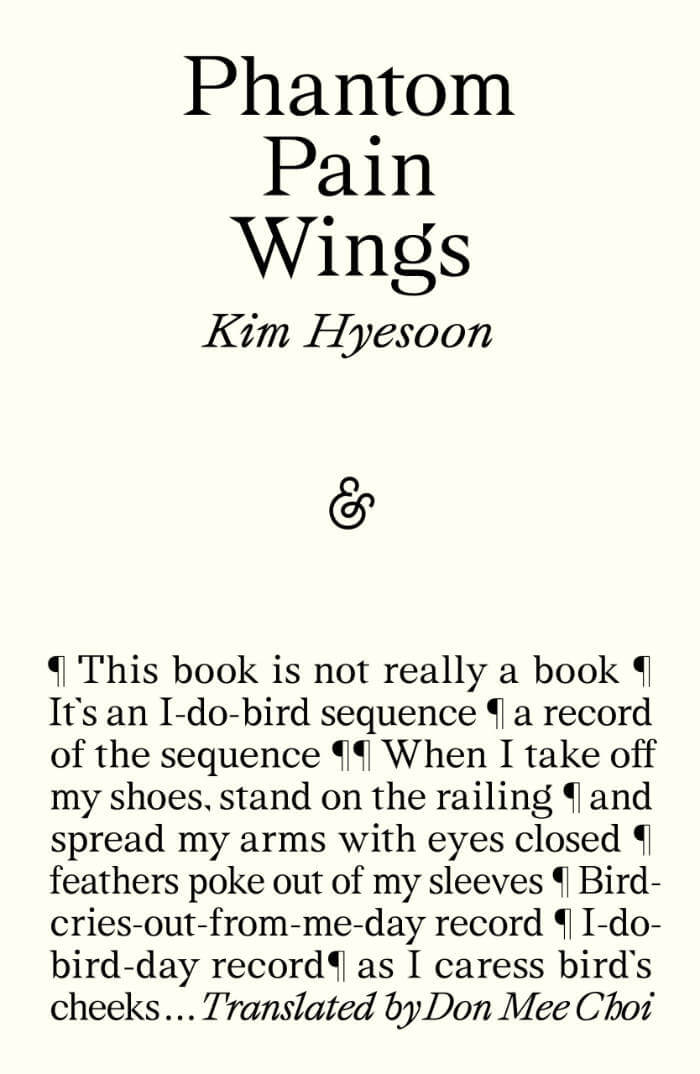
Phantom Pain Wings
Kim Hyesoon is an iconic figure in feminist poetry. In her new collection, she depicts the memory of war trauma and the collective grief of parting through what she calls an ‘I-do-bird-sequence’. Through intensely rhythmic lines marked by visual puns and words that crash together and then fly away as one, Kim mixes traditional folklore and mythology with contemporary psychodramatic realities as she taps into a cremation ceremony, the legacies of Rimbaud and Yi Sang, a film by Agnès Varda, Francis Bacon’s portrait of Pope Innocent X, cyclones, a princess trapped in a hospital, and more. A simultaneity of voices and identities rises and falls, existing and exiting on their delayed wings of pain.
Winner of the 2024 National Book Critics Circle Award for Poetry (USA)
2024 Poetry Book Society Translation Choice
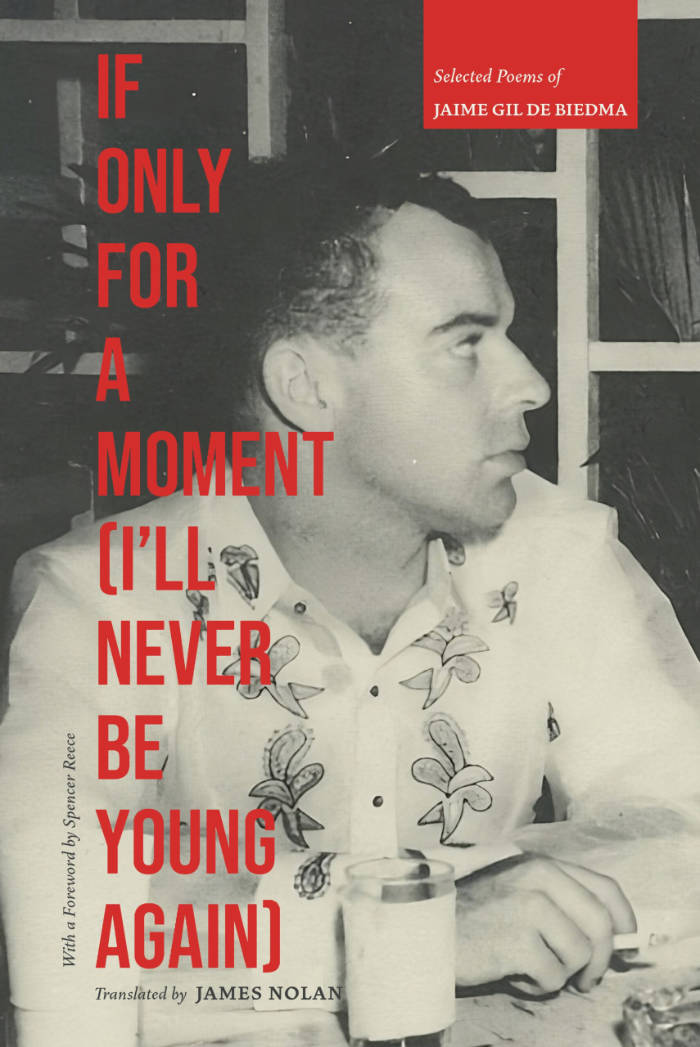
If Only For a Moment (I’ll Never Be Young Again)
Jaime Gil de Biedma, James Nolan
Jaime Gil de Biedma is the most original and influential among the poets known as the ‘50’s Generation in Spain, and is considered the greatest Spanish poet to emerge in the second half of the 20th century. His life and literary career were bracketed almost entirely by the rise and fall of Generalissimo Francisco Franco, notorious for the suppression of literature. Born in 1929, Gil de Biedma was six years old when García Lorca was murdered in Granada at the outbreak of the Civil War, and his collected poems, Las personas del verbo, first appeared in 1975, the year Franco died. What is surprising is that Gil de Biedma was a leftist, homosexual poet from the Catalan capitol, Barcelona – all of Franco’s favorite things – who not only published books of autobiographical poetry in Spain but was known as a poet of social conscience as well as erotic lyricism. Like other Spanish poets of his time, he chose his words carefully. Gil de Biedma died of AIDS in 1990.
If Only For a Moment (I’ll Never Be Young Again) consists of an extensive bilingual selection of Gil de Biedma’s poetry, including all of his most well-known work. The book additionally consists of a Foreword by Spencer Reece, Jaime Gil de Biedma’s short essay “I wanted to be the poem,” and two different essays on Gil de Biedma and the art of translation by James Nolan, the volume’s translator.

Notice
A classic queer text of trauma, written by one of the most talented novelists of her generation.
Published by Doubleday in 1994, Heather Lewis's chilling debut novel took place on the northeastern equestrian show-riding circuit, to which Lewis herself belonged in her teens. Expelled from boarding school, its fifteen-year-old narrator moves numbly through a world of motel rooms, heroin, dyke love, and doped horses. Kirkus Reviews found it “brutal, sensual, honest, seductive … a powerful debut,” while the New York Times found the book “grating and troublesome … it's difficult to imagine a more passive specimen.”
Almost immediately, Lewis began writing Notice, a novel that moves even further into dark territory. The teenaged narrator Nina begins turning tricks in the parking lot of the train station near the Westchester County home of her absent parents. She soon falls into a sadomasochistic relationship with a couple. Arrested, she's saved by a counselor and admitted to a psychiatric facility. But these soft forms of control turn out to be even worse. Writing in the register of an emotional fugue state, Notice's helpless but all-knowing narrator is as smooth and sharp as a knife.
Rejected by every publisher who read it during Lewis's life, Notice was eventually published by Serpent's Tail in 2004, two years after her death. The book, long out of print, emerged as a classic queer text of trauma, written by one of the most talented novelists of her generation.
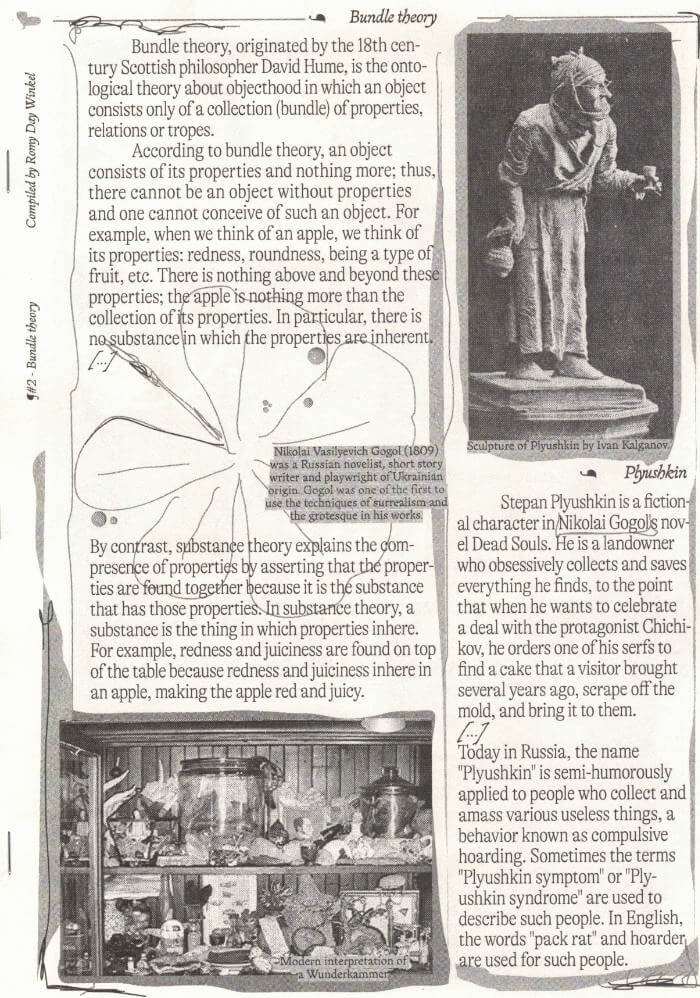
¶#2: Bundle theory
For #2 in the ¶ (Pilcrow)-series Romy Day Winkel has approached collecting, or hoarding, as an aesthetic of patience. Through her selection of Wikipedia-articles she looks at what happens when objects, magical or otherwise, are all put together. If it is impossible, and perhaps even uninteresting, to know when a collection or archive is finished, how does one start to hoard impatiently
¶#2 consists solely of texts and images found on the online collaborative platform Wikipedia. ¶#2 is assembled by Romy Day Winkel, designed by Tjobo Kho and Wouter Stroet, edited by Jan-Pieter ‘t Hart and published by OUTLINE.

Mountainish
Zsuzsanna Gahse, Katy Derbyshire
A narrator and her dog are criss-crossing the Swiss Alps. She travels with friends who share her interest in food, languages and their topographical contexts. They collect colours, even look for colourlessness, and develop the idea of a walk-in diary, a vain attempt to archive their observations, encompassing portraits, descriptions and ruminations on mountains, hotels, people, language, food, flora and fauna.
Gradually, other mountains appear in their observations and memories, as do the mountains of literature and art. Mountains may be sites of fear and awe, of narrow-mindedness, racism and ever-looming collapse; Alpine lodges may be places of hospitality, retreat and unexpected encounters; of nature under threat.
In 515 notes, Zsuzsanna Gahse unfolds a finely woven interplay between her six characters while giving us a vivid panorama of mountain worlds, a multi-layered typology of all things mountainish.
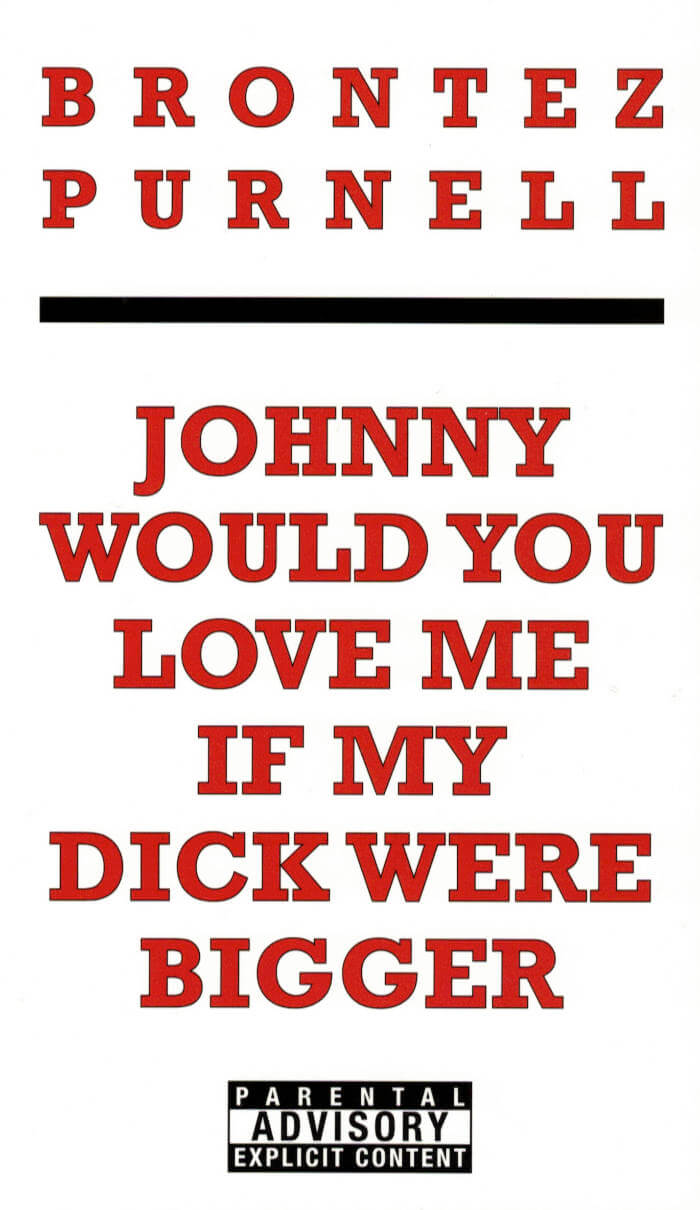
Johnny Would You Love Me If My Dick Were Bigger
A dirty cult-classic put out in a small batch by an underground publisher (Rudos and Rubes) in 2015, Johnny Would You Love Me If My Dick Were Bigger recounts the life of an artist and "old school homosexual" who bears a big resemblance to author Brontez Purnell.
Our hero doesn't trust the new breed of fags taking over San Francisco, though. They wear bicycle helmets, seat belts, and condoms. Meanwhile, he sabotages his relationships, hallucinating affection while cruising in late night parks, bath-houses, and other nooks and crannies of a newly-conservative, ruined city.
Furiously original, vital, and messy, this funny "non-memoir" uncovers a revelatory truth for the age: there are things far scarier than HIV.
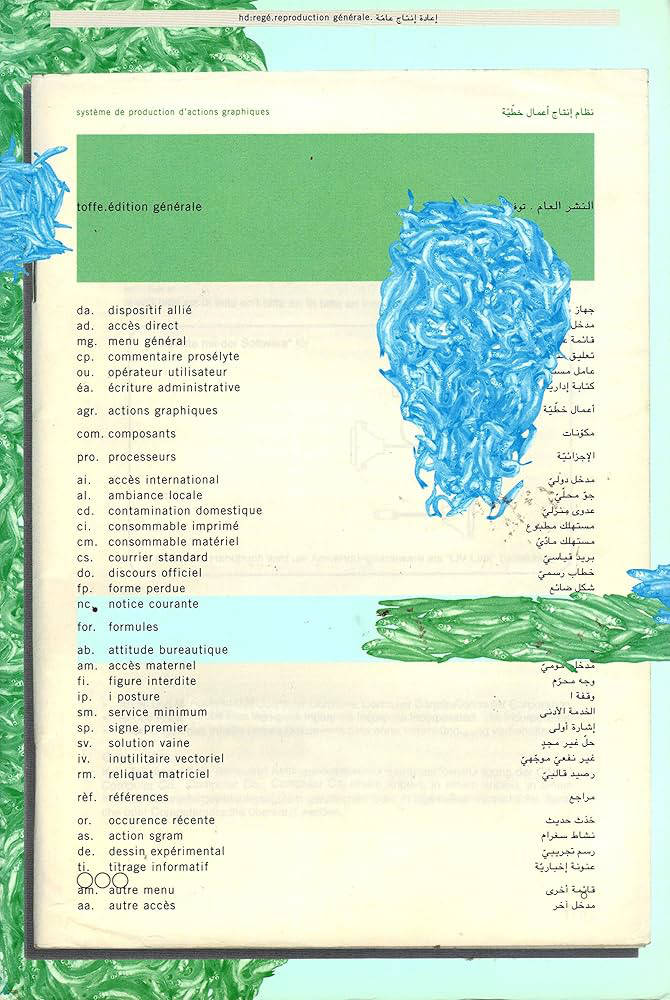
Toffe. édition générale : système de production d'actions graphiques
toffe. édition générale
publication issue de reproduction générale,
système de production d'actions graphiques
développé en trois temps :
projection générale
dispositif multi-écran, pour la chaufferie
galerie de l'école supérieure des arts décoratifs de strasbourg
du 14 février au 23 mars 2003
présentation, édition générale
école nationale supérieure des beaux-arts d'alger
du 24 mai 2003
exposition, occurrence récente
diffusion, édition générale
galerie madé, paris
du 12 mai au 5 juin 2003
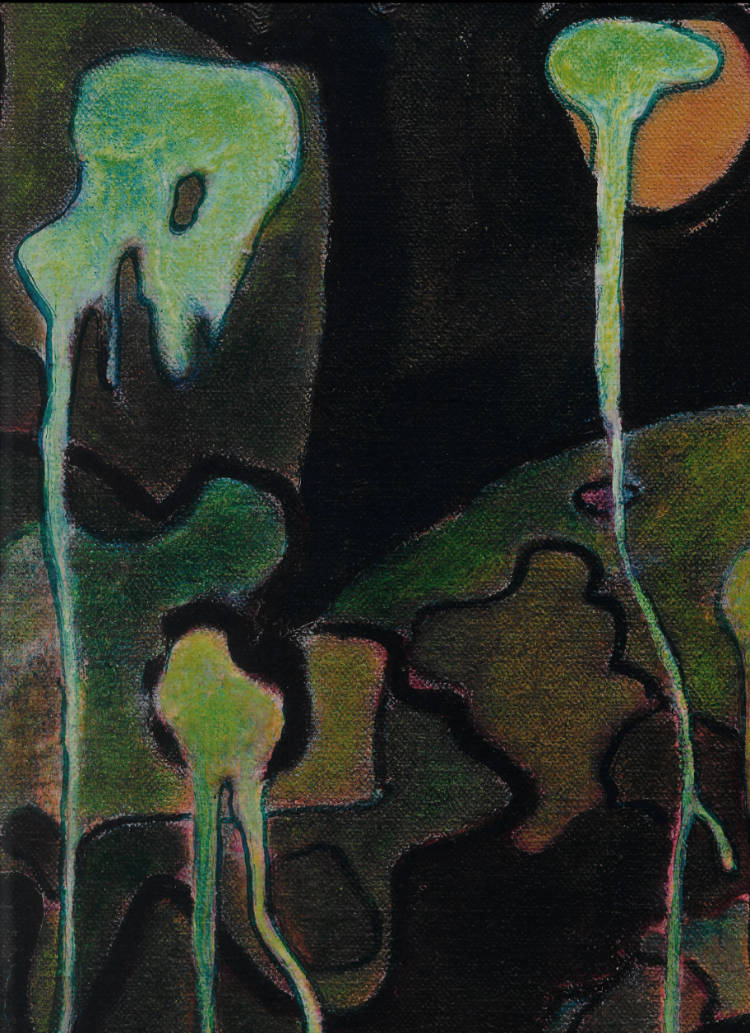
Ding Dong Bell
Ding Dong Bell is an invitation to cross the threshold into a world that belongs not only to the imagination, but also to the concrete possibility of a different way of inhabiting reality. In this space, details weave together landscapes and reveal characters, hinting at unexpected encounters in a continuous search for shapes and textures, in a chromatic immersion and a sequence of perspectives on a syncretic and archaic world, on an alchemical pictorial practice, where the complex figurative iconography of living beings and cosmic constellations is progressively enriched with tonal stratifications and semantic density.
The collection of paintings outlines universes in which plants, animals, human beings, and subtle presences coexist outside any pre-established hierarchy. The forms cross each other lymphatically and transform without ever being fully accomplished, metamorphically generating a visual ecosystem based on the continuous exchange of substances and the visceral mixture of matter. In this fluid chorus, everything is constantly redefined in the process of becoming, yet without losing its identity. What emerges is a symbolic horizon that becomes a universal hope: an invitation to living beings, witnesses of contemporaneity, to cultivate mutual respect and nurture a providential alliance, where the different planes of existence vibrate in resonance.
The titles of the works, inspired by traditional English nursery rhymes, and the accompanying texts take the form of ancient and surreal chants, capable of evoking both the childhood of the world and its possible future. Their language, closer to illuminated manuscripts than to linear narration, constructs a vivid imaginary world in which whirlwinds and impulses evoke the idea of original totality: at the end of this long succession of worlds, everything seems to tend towards a single, shared substance of being.
Barbara Cammarata (born in 1977) lives and works in Catania (Sicily).

KILOBASE BUCHAREST A-Z
Sandra Demetrescu, Dragoș Olea
KILOBASE BUCHAREST A-Z is a publication which is describing Bucharest through a sort of experimental alphabet book: for each letter of the English alphabet, artists, writers, architects and researchers were invited to choose a key term and develop a contribution representing a sliver of the Romanian capital city, capturing a polyphonic set of perspectives on the infinite facets of a city whose identity is notoriously difficult to define.
Contributions by: Irina Bujor, Serioja Bocsok, studioBASAR, Iuliana Dumitru, Ștefan Ghenciulescu, Kilobase Bucharest, Apparatus 22, Mihnea Mihalache-Fiastru, Ștefan Constantinescu, Sabine Bitter & Helmut Weber, Gruia Bădescu, Ioana Ulmeanu, Decebal Scriba, Sillyconductor, Prosper Center, Geir Haraldseth, Jimmy Robert, Karol Radziszewski, Lea Rasovszky, Ștefan Botez, Simina Neagu, Bogdan Iancu, Andrei Mihail, Mihai Lukács, Mihai Mihalcea, Cosima Opârtan, Juergen Teller, Hans Leonard Krupp.
The publication also includes a republished insert by late artist Ioana Nemeș, and three reprinted contributions previously published in Kilobase Bucharest A-H (Mousse Publishing, 2011) produced on the occasion of "Image to be projected until it vanishes" exhibition at Museion Bolzano.

Glass Urinary Devices
In 2015, artist Patty Chang (1972) followed the South-to-North Water Diversion Project, the longest aqueduct in the world, which brings water from southern to northern China. While walking, she collected her urine in plastic bottles, drinking their contents before refilling them, in turn drawing a connection between the large-scale infrastructural attempt to control the flow of water and the uncontrollable flows of her own body. Once back in Boston, Chang began making a series of portable urinary devices from discarded plastic bottles, which were then hand-blown in New York by glass-blower Amy Lemaire. In fashioning them from discarded plastic and rendering them permanent in glass, the devices channel Chang’s unfolding ruminations on water as a point of connection between geopolitics, human excess and waste. Designed by Sabo day, this indexical publication is the first book dedicated to depicting the series of sixty-four sculptures in its entirety. It was published on the occasion of Patty Chang’s exhibition at A Tale of A Tub, which ran from September 14–November 3, 2024.

DOMMAGE#1
Edition of drawings, paintings and scans by Sophia Hamdouch, wrapped in a vinyl sleeve.

next move in mirror world
Published in conjunction with the first major U.S. museum show of Joan Jonas’s art in nearly fifteen years, this monograph features new scholarship on her multimedia installations and performance practice from the early 1970s to the present. Inspired by the format of a reader, it breaks new ground by contextualizing and expanding understandings of Jonas’s body of work through three thematic approaches: the critical notions of gender, being and otherness; the politics of landscape and ecology; and new conceptions of medium specificity and un-specificity. Richly illustrated, with never-before-published sketches and drawings, the volume includes an interview with the late Douglas Crimp and Jonas’s personal reflection on their enduring friendship.
Edited by Barbara Clausen and Kristin Poor with Kelly Kivland, with an introduction by Clausen; essays by Clausen, Adrienne Edwards, André Lepecki, Poor, and Jeannine Tang; interview with Douglas Crimp; writings by Joan Jonas; conversation between Heather Davis, Joan Jonas, and Zoe Todd; and coda by Kivland

When My Body Was A Clinched Fist
"Back in the day when KRS-One intoned —The Bridge is over!— he did not prefigure a poet from Queens of the fierce attitude and intellectual magnitude of Enzo Silon Surin. WHEN MY BODY WAS A CLINCHED FIST gives the Heisman to such a refrain with lyrical power-packing poetics that settles the score with a succinct— Not! No the Bridge is not over, for Surin's Queens is alive and well and under the gaze of a master observer who eulogizes lives that though at times are battered have always mattered.
Enzo Silon Surin's poems get you caught up in the deeply personal experiences of growing and visceral all-encompassing knowing from an acute witness of every breath and follicle of Black life from palm trees, sand and sea to street corner projects, suburban houses and fistfuls of black water. Surin writes about the confused and disconnected, trigger happy wannabes trapped by outdated notions of masculinity, the cracked head crackheads all held in the clutch of society's clinched fist through which the trauma that comes with being of color, addicted, broke, lost and tossed, is itself a clinched fist of black bodies caught in the Russian nesting doll America's clinched fists make.
WHEN MY BODY WAS A CLINCHED FIST is an elegy for 'the premature exits.' It is a blues for the black-on-black black and blue. Surin yields his pen like a microscopic scalpel whereby an autopsy of possibility is performed to un-clinch the remarkable bone gristle poetry in these unflinching heart-wrenching pages."—Tony Medina
Enzo Silon Surin, Haitian-born poet, educator, speaker, publisher and social advocate, is the author of two chapbooks, A Letter of Resignation: An American Libretto (2017) and Higher Ground. He is the recipient of a Brother Thomas Fellowship from The Boston Foundation and is a PEN New England Celebrated New Voice in Poetry. Surin's work gives voice to experiences that take place in what he calls "broken spaces" and his poems have appeared in numerous publications including Crab Orchard Review, Origins, Transition Magazine/Jalada, Interviewing the Caribbean, jubilat, Soundings East, The BreakBeat Poets: New American Poetry in the Age of Hip-Hop, and sx salon. Surin holds an MFA in Creative Writing from Lesley University and is currently Professor of English at Bunker Hill Community College and founding editor and publisher at Central Square Press. His debut full-length poetry collection is WHEN MY BODY WAS A CLINCHED FIST (Black Lawrence Press, 2020).

MISSING
As our streets become ever more securitised and visually sanitised, and as most forms of everyday communications are shifting to the digital realm, homemade missing posters are one of the few remaining forms of paper-based citizen expression still found in public spaces.
Drawing on a collection of several hundred missing animal posters collected over the last 10 years, “MISSING” brings seemingly isolated text fragments into conversation to weave a narrative of loss and hope.
Featuring exaggerated duotone images, the publication explores the link between the weathering of physical posters and the fading away of cherished memories. While looking through these visual artefacts, one is left to wonder how many of these animals have been reunited with their families.
Printing: Risograph, Grafische Werkplaats Den Haag; Photography and colour separations: Livio Liechti; Design: Apsara Flury.
First print run (Blue) – Dec 2024: 40 copies.
Second print run (Teal) – May 2025: 50 copies.

On Dangerous Ground
Vaginal Davis offers insights into her collaborative practice of making music in art-punk bands in Los Angles and Berlin.
The artist Vaginal Davis certainly moves on dangerous ground with her transgressive shuffling of gender and genre boundaries. The self-described "sexual repulsive" co-founded several art/punk bands in her expansive 40-year-plus career, namely Afro Sisters, ¡Cholita!, Pedro, Muriel & Esther (PME), black fag and Tenderloin. As a writer and "Whoracle et Delphi", Ms. Davis turns her quirky hairy eyeball to the collective practice of making music in the saucy underground scenes of Los Angeles and Berlin. In their contributions, longtime comrades and collaborators Bibbe Hansen (artist and Warhol Silver Factory habitué) and Felix Knoke (guest performer for The Hidden Cameras and band member of Tenderloin) rave about joint performances and rehearsals, divulging sacred secrets and rifts. Bruce "Judy" LaBruce, Glen Meadmore and Lisa "Suckdog" Carver make surprise guest appearances, along with images from live performance spectacles The White to Be Angry, Trust Fund, Interracial Dating Game, We're Taking Over, Afro De Sade and Camp/Anti-Camp: A Queer Guide to Everyday Life.
Edited by Jenny Schlenzka and Julia Grosse.
Texts and works by Vaginal Davis, Bibbe Hansen, Felix Knoke.
Published on the occasion of Vaginal Davis's exhibition at Gropius Bau, Berlin, in 2025.
Vaginal Davis is a Berlin-based American intersexed artist, queer icon of art and music. Vaginal Davis herself is a living work of art: a performer, writer and creator of iconic zines; a visual artist, experimental filmmaker; a self-proclaimed Blacktress and drag terrorist, a gossip columnist, influential socialite, educator and countercultural renegade. Since the late 1970s, her oeuvre has pushed the boundaries of art, music and performance. Inspired by the militancy of the Black Panthers’ pursuit of social justice in the United States, she named herself after feminist and Black Power activist Angela Davis.

Hermaphrodite Logic: A History of Intersex Liberationv
How the intersex liberation movement exposed medical harms and became an inspiration to rethink sex and gender.
Hermaphrodite Logic is a bold examination of intersex liberation. Juliana Gleeson reveals how a movement challenged systemic medical abuses to reshape our understanding of sex. Blending philosophical insights and personal testimonies, Gleeson argues that intersex people have been harmed not just for therapeutic reasons but to ease professional and parental anxieties.

sex and place vol 2
Adriano Wilfert Jensen, Andrea Zavala Folache
sex and place is a series of workshops and publications exploring score-based and semi-anonymous writing as a tool for articulating shared concerns.
Vol 2 ‘discores’ is written by Kexin Hao, Luca Soudant, HaYoung, Andrea Zavala Folache & Adriano Wilfert Jensen. Five strangers are stuck in changing boots next to each other and decide to embark on an intimate conversation starting from the question: “What is troubling your sexuality at the moment?”.
The ‘sex and place’ series is part Domestic Anarchism, a project devoted to coalition-building beyond biological, chosen, or national conceptions of family. Dance serves as a set of tools and knowledge that can be applied beyond “the spectacle” to collectively study, write, and move.
Andrea Zavala Folache and Adriano Wilfert Jensen are choreographers and they co-parent three-year-old Penélope Cleo. Andrea and Adriano use dance and choreography to think about the distribution of care and solidarity beyond ‘the family’, and in turn consider how such a distribution could inform their dance practice. Inevitably themes like sex, economy, gender, and class get activated. But also notions such as prefiguration, anarchism, clitoridian* thinking, zones of non-domination and coalition building. They see dance as a knowledge that can be applied to different practices. Some of these include: co-habitations, score based writing and dancing, self-organised study groups and publications, workshops and dance performances.

How to Sleep Faster 1
How to Sleep Faster is published as part of the collaborative discussion that form the critical direction of the gallery. and sits alongside the first two exhibitions – Sleep Faster (February), and How to Carve Totem Poles (March). It has been put together as an open ended continuation of this dialogue through which we seek to understand the contradictions / complexities that define and form our experience, existence and participation in a contemporary digital-analogue creative environment.
Arcadia Missa Publications; Rozsa Farkas, Tom Clark, Jammie Nicholas, Laura Farley (eds).